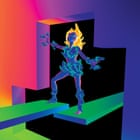There’s often a whiff of joss sticks surrounding the music of Los Angeles-based composer Kaitlyn Aurelia Smith. In the past she has made an LP of drones for yoga and meditation, a new age album that was premiered on the Calm app, and she’s even written a pocketbook called Listening (complete with cards featuring “listening exercises”).
But Smith is also a leading figure in modular synthesis. She studied composition and sound engineering at Berklee College of Music, falling under the spell of Steve Reich, and later acquired an enormous Buchla synthesiser, using it to make several solo albums of burbling electronica. She has also made a synth-pop concept album about the life cycle, recorded a duet with her mentor Suzanne Ciani and another collaboration with Hollywood composer Emile Mosseri.
Some tracks on this new album hark back to Smith’s earlier fascinations: Check Your Translation, Pivot Signal and Then The Wind Came draw from Reichian phased minimalism, but here these glistening arpeggios are overlaid with heavenly, digitally harmonised vocals. Elsewhere the minimalism collides with poppy electronica and Afrobeat rhythms, as if tape footage from a dozen sessions has been cut into fragments and assembled at random. Tracks frequently change tempo, key and mood, while discordant elements overlap.
The result is often similar to one of Charles Ives’s polytonal pieces – but, where Ives replicated the sound of, say, a brass band marching past a church choir, Smith’s music often sounds like a dozen mobile phone ringtones going off in a video games arcade while a west African drum circle rehearse on the street outside. Occasionally, this cacophony sounds sublime.
Also out this month
Takuro Okada is a 29-year-old Japanese guitarist whose album Betsu No Jikan (Newhere Music/Space Shower Music/Bandcamp) starts with an oblique version of John Coltrane’s A Love Supreme, but it’s the trippy astral jazz of Alice Coltrane that dominates – an all-enveloping riot of low-volume percussion, quavering sax solos, rippling piano and woozy string instruments. Sam Gendel, Carlos Niño and Jim O’Rourke guest. Diamanda Galás is one of the few contemporary artists whose music can truly be described as gothic. Her latest, Broken Gargoyles (Intravenal Sound Operations), is filled with strangled banshee wails, creaky medieval drones, dark ritualistic utterances in German and horror-movie soundscapes that are genuinely quite terrifying. Montreal quintet Esmerine explore that liminal zone between post-rock and drone-based minimalism, and their Everything Was Forever Until It Was No More (Constellation) is dominated by lovely, spartan melodies played on strings and piano. Bruce Cawdron’s marimba is the star of Foxtails & Fireflies, while Brian Sanderson’s horns carry the haunting Fractals for Any Tonality.

